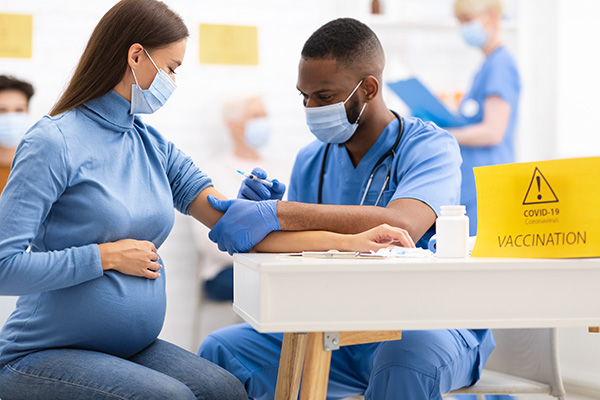Disclosure :: This post is sponsored by Our Lady of the Lake Children’s Health and written by Dr. Chad Gnam III, OB-GYN.
COVID, Pregnancy & Fertility: Know the Facts
 There are many theories and opinions about how the COVID-19 virus and vaccines impact pregnancy and fertility. The truth is less scary.
There are many theories and opinions about how the COVID-19 virus and vaccines impact pregnancy and fertility. The truth is less scary.
It seems everyone is talking about COVID-19 vaccination these days for one reason or another. The chatter seems to be loudest among moms-to-be and those trying to conceive. Is it safe? Does the vaccine cause infertility? How will it impact my pregnancy? Are doctors recommending it? Can I continue to breastfeed if I receive the vaccination?
These are all great questions. Women searching for answers can easily drown in the sea of information available on web and social media sites. But, before you put too much stock in what a web site, app or influencer are telling you, consider the science.
Is the vaccine safe?
The American College of Obstetricians & Gynecologists (ACOG) currently recommends FDA-approved vaccines should be given to moms-to-be and lactating moms who are eligible to receive them. At present, the approved vaccines include the Pfizer-BioNtech mRNA vaccine, recommended for ages 16 and up, and Moderna MRNA-1273 vaccine for ages 18 and up.
Both are mRNA vaccines that do not contain a live virus. Instead, they contain a protein that mimics the protein on the COVID-19 virus, which causes the body to create antibodies to fight the disease. The vaccines do not alter human DNA. They do not cause genetic changes in the recipient, contrary to speculation prevalent online.
Do we know what will happen in the long run? The answer, for now, is no because COVID-19 and the vaccines have not been around long enough for science to collect sufficient data to make that determination. For now, the same number of women, pregnant or not, are contracting COVID-19. But, the morbidity and mortality are higher in pregnant patients.
What does that mean? Well, it means pregnancy places you in a high-risk category for contracting COVID-19 because, once infected, the likelihood of complications and severe side affects are greater. Those risks increase for women with obesity, high blood pressure, diabetes and other chronic medical conditions that existed before pregnancy.
Does the vaccine cause infertility?
The Pfizer and Moderna vaccines have not been tested on pregnant women or those attempting to conceive, according to ACOG.org. There is not sufficient data to say the COVID-19 virus itself is affecting fertility or pregnancy. Likewise, at this time, there is no sufficient data saying it isn’t.
Consider what we know today. Women with the virus are getting pregnant. This may be because couples spent more time together while in quarantine. We’re not going to know the impact on the fertility rate for a year or more. But, by current indications, we are seeing an increase in pregnancies and deliveries.
Are doctors recommending the vaccine?
Some are. Some aren’t. Your pregnancy is unique, so your provider’s recommendations will be tailored to your and your baby’s individual healthcare needs.
ACOG recommends providers have an open discussion with their patients who are trying to conceive, those who currently are pregnant and those who’ve recently delivered. Conversations should focus on the latest information available about the virus and vaccines. The discussion is intended to help you make an educated decision about whether or not to receive the vaccine; however, the discussion should not be required for you to receive the vaccine. You should cover:
- What is the current number of COVID cases in the region?
- How safe is the vaccine? How effective is it?
- How severe could the virus and potential side affects be to me and my baby?
- Will the vaccine or virus affect my breastmilk?
By getting the vaccine, you are arming your body with the tools it needs to combat infection and the severity of infection should you contract COVID-19. You will transmit the antibodies to your baby while pregnant and through your breastmilk after delivery, thus giving your baby the same level of protection.
No matter what you ultimately decide, remember the medical community continues to recommend simple steps you can take to keep you and your baby safe during the pandemic: Wash your hands. Wear a mask. Social distance. If you do attend a gathering, keep it to less than 10 people. And, don’t go from small gathering to small gathering. Exposure to each group increases your potential risk of infection.
I have COVID-19, and I’m pregnant. Now what?
There’s no reason to be alarmed. Your OB-GYN likely will increase your visit frequency to weekly until you recover. Visits include checking in on the health of the baby inside and the functionality of the placenta – is it providing the appropriate amount of oxygen and nutrients, taking away waste products and is the baby on the correct growth curve.
We’re being extra careful with patients who have or had the virus to be sure we’re not missing anything. Insurance companies are covering the additional testing and closer monitoring of infected moms-to-be.
How will being COVID positive affect the delivery?
You will be tested the day before. Most are asymptomatic. Your OB-GYN and hospital team are experienced and ready to help you with a successful delivery, even in this circumstance.
The good news is we are learning more each day about COVID-19, its variants and their impact on multiple aspects of life and health. There is a vast sea of great information out there that is being updated as we learn more. There seems to be no shortage of people telling you what to do, what to believe. At the end of the day, do what’s best for you and your baby. That begins with a visit to your OB-GYN to get the facts and learn how they affect your body and your pregnancy.
Breakout
The truth about the COVID-19 vaccine for moms-to-be and those attempting to conceive:
- Current data indicates COVID-19 and the approved FDA vaccines do not cause infertility in women or men.
- Nearly the same number of women conceived after receiving the Pfizer-BioNTech vaccine in a random, blind trial as those who received the placebo.
- The coronavirus’s spike protein and syncytin-1 (protein that mediates placental cell fusion) share small stretches of the same genetic code but are otherwise completely different in structure. The vaccine does not induce an immune reaction against the syncytin-1 placental protein.
- mRNA vaccines are taken up rapidly by muscle cells at the injection site and the mRNA is degraded in the cell once the protein is made so it does not cross the placenta.
- COVID-19 vaccination is recommended for women who are contemplating pregnancy or who are pregnant in order to minimize risks to themselves and their pregnancy.
— source: American Society for Reproductive Medicine
About the Author
— Dr. Chad Gnam III is an OB-GYN with St. Dominic Hospital in Jackson, Miss., part of the Franciscan Missionaries of Our Lady Health System that includes Our Lady of the Lake in Baton Rouge, La. Discover more at StDom.com.



















As a mother who is considering having another child, I find this expert “advice” very off-putting & biased from the very start of the post. My trust was lost immediately when you made no mention of approval under the Emergency Use Authorization route, and equated FDA approval with approval under EUA, which you should know better than a layperson like met that it is not the same thing.
From FDA.gov:
[What is an Emergency Use Authorization (EUA)?
An Emergency Use Authorization (EUA) is a mechanism to facilitate the availability and use of medical countermeasures, including vaccines, during public health emergencies, such as the current COVID-19 pandemic. Under an EUA, FDA may allow the use of unapproved medical products, or unapproved uses of approved medical products in an emergency to diagnose, treat, or prevent serious or life-threatening diseases or conditions when certain statutory criteria have been met, including that there are no adequate, approved, and available alternatives. Taking into consideration input from the FDA, manufacturers decide whether and when to submit an EUA request to FDA.
Once submitted, FDA will evaluate an EUA request and determine whether the relevant statutory criteria are met, taking into account the totality of the scientific evidence about the vaccine that is available to FDA.]
Vaccine manufacturers are expected to include their plan for following up on the vaccine’s safety, which includes thoroughly investigating ANY reports of deaths, hospitalizations, and other serious adverse events, among those who receive the vaccine under an EUA.
While much of the info provided above could be helpful, this really reads as more propaganda than it does as helpful info for fertile women. Furthermore, there is no longer a solid control group for long-term follow-up since the trial particpants have been unblinded and most chose to take the vaccine when it was offered. We are still in an ongoing large-scale experimental trial with all of these vaccines approved under EUA, and it is telling that the language used in this post failed to make mention of these important distinctions.
The best answer to the questions posed in the post is: we don’t yet know.